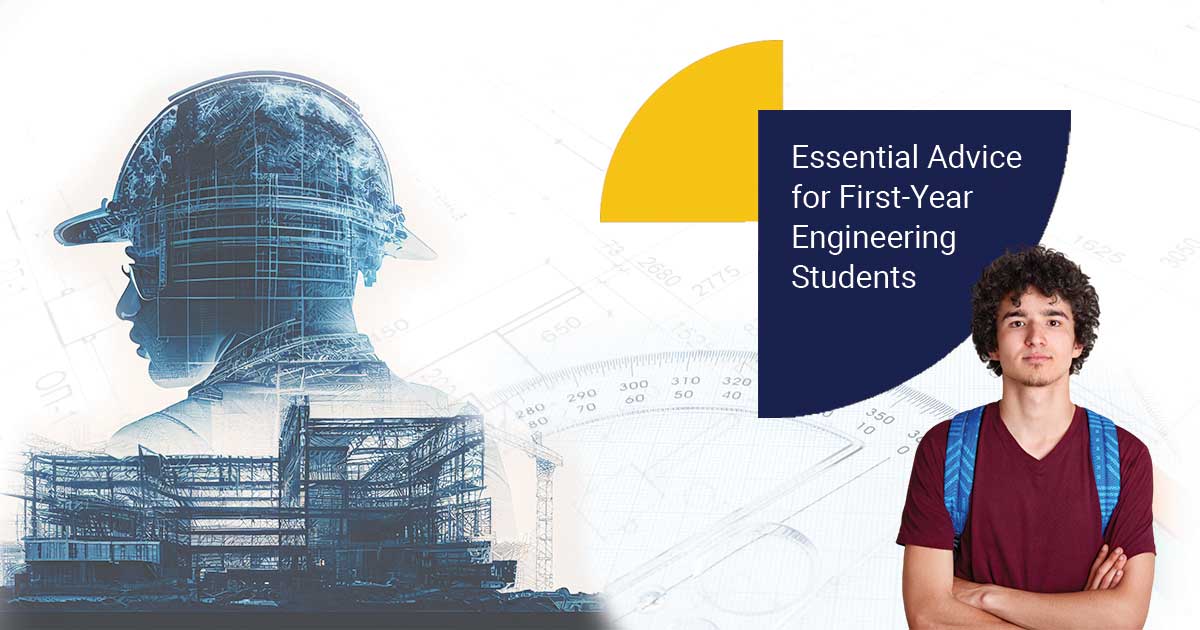FET Blogs


FET Blogs



10 July 2023
Essential Advice for First-Year Engineering Students
Are you a first-year engineering student looking for a guide to help you through your engineering journey?
If yes, this blog is for you. You must have heard that all your ordeals might end after your 12th, but this is a myth. The real struggle starts from the time you enrol in a college, especially if you are in a technical field like engineering. We all know that engineering is one of the most sought-after degrees in the world today.
Passing the strict entrance examinations and going through all the preparation to be where you are today is definitely something to be proud of. However, one must not think that the journey ends here because this is where the race for the future begins. With rapid globalisation and increased competition in the sector, securing a career is no longer easy.
We understand the gravity of the situation because, at JAIN’s (Deemed-to-be-University) Faculty of Engineering and Technology, we help our engineering students navigate through this journey seamlessly. From our experience and expertise throughout the years, we have come up with some valuable advice to help first-year engineering students like you! Read on.
Staying organised helps you streamline your priorities and stay on track. For example, keeping a weekly or monthly planner helps you plan the days prior so that you are well-prepared for an exam or assignment or project submission. Also, by creating a well-planned study schedule, you can cover your syllabus, prepare for mock tests, and score well on your assessments. Besides this, you can also break down larger tasks, such as projects or assignments, into smaller, manageable tasks. This will make them less overwhelming and easier to tackle. You can do this by creating a to-do list and prioritising tasks based on urgency and importance.
Many of you might skip revising the fundamental concepts once you join the engineering college. Revisiting the important topic you studied earlier is recommended because these concepts set the foundation for the next four years of your engineering programme. You need to concentrate on the fundamentals of physics, mathematics, and chemistry to be prepared for future subjects and topics. It’s never a bad idea to polish your knowledge as this will enhance your basic engineering skills.
As an engineering student, it's crucial to understand that engineering goes beyond memorization. Remember, it involves both theoretical knowledge and practical application. These will allow you to implement practical learning in real-world settings during your internship or job in the future. Therefore, you must grab every opportunity that comes your way, allowing you to access hands-on learning practices. You can participate in laboratory sessions, workshops, or projects that allow you to apply theoretical knowledge to real-world scenarios. This will enhance your understanding and make the learning experience more enjoyable.
Engineering, once perceived as purely technical, now incorporates a corporate aspect. In today's competitive market, networking with specialists is vital for seizing timely opportunities. For instance, maintaining a positive relationship with mentors or trainers during internships can lead to job opportunities through referrals. You must make connections with professors, alumni, mentors, industry professionals, guest lecturers, and anyone else you come across during your journey who can add value. You can do this by participating in engineering conferences, seminars, workshops, and career fairs. These events provide opportunities to connect with professionals, learn about industry trends, and explore potential job opportunities.
An engineering programme can be physically and mentally cumbersome for any young adult like you. Long hours of project work, assignments, and critical assessments can often lead to physical and mental exhaustion. By maintaining a healthy lifestyle, you allow your body and mind to free itself from unnecessary stress and pressure. You can prioritise tasks, set realistic goals, and avoid excessive procrastination to create a well-balanced routine and avoid last-minute stress. Engage in moderate physical activities such as swimming, cycling, jogging, or yoga for at least 30 minutes every day to keep yourself physically fit. You must eat a balanced diet and maintain a proper sleep schedule for your overall well-being.
As exciting as your engineering journey can be, it can also be challenging and demanding at times. However, by implementing the tips mentioned above, you can navigate through your engineering journey more smoothly. While staying organised helps you manage your time effectively, exposing yourself to hands-on learning opportunities allows you to stay prepared for real-world scenarios. Most importantly, building a strong network of connections with professors, mentors, and industry professionals opens doors to potential opportunities in the future. Lastly, practising a healthy lifestyle will help you manage stress. By following these guidelines, we are sure that you can make the most of your engineering journey and lay a strong foundation for your future career.
A1: Engineering students need math, physics, problem-solving, and coding basics.
A2: Engineers ask: Is it feasible? Is it safe? Is it sustainable?
A3: Build a strong foundation in math, physics, and critical thinking skills.
Popular Post
17 February 2026
AIE Full Form
10 February 2026
AEIE Full Form
22 January 2026
AE Full Form
16 January 2026
What is Aerospace Engineering?
16 January 2026
What is Chemical Engineering?
Ask an Expert for Free